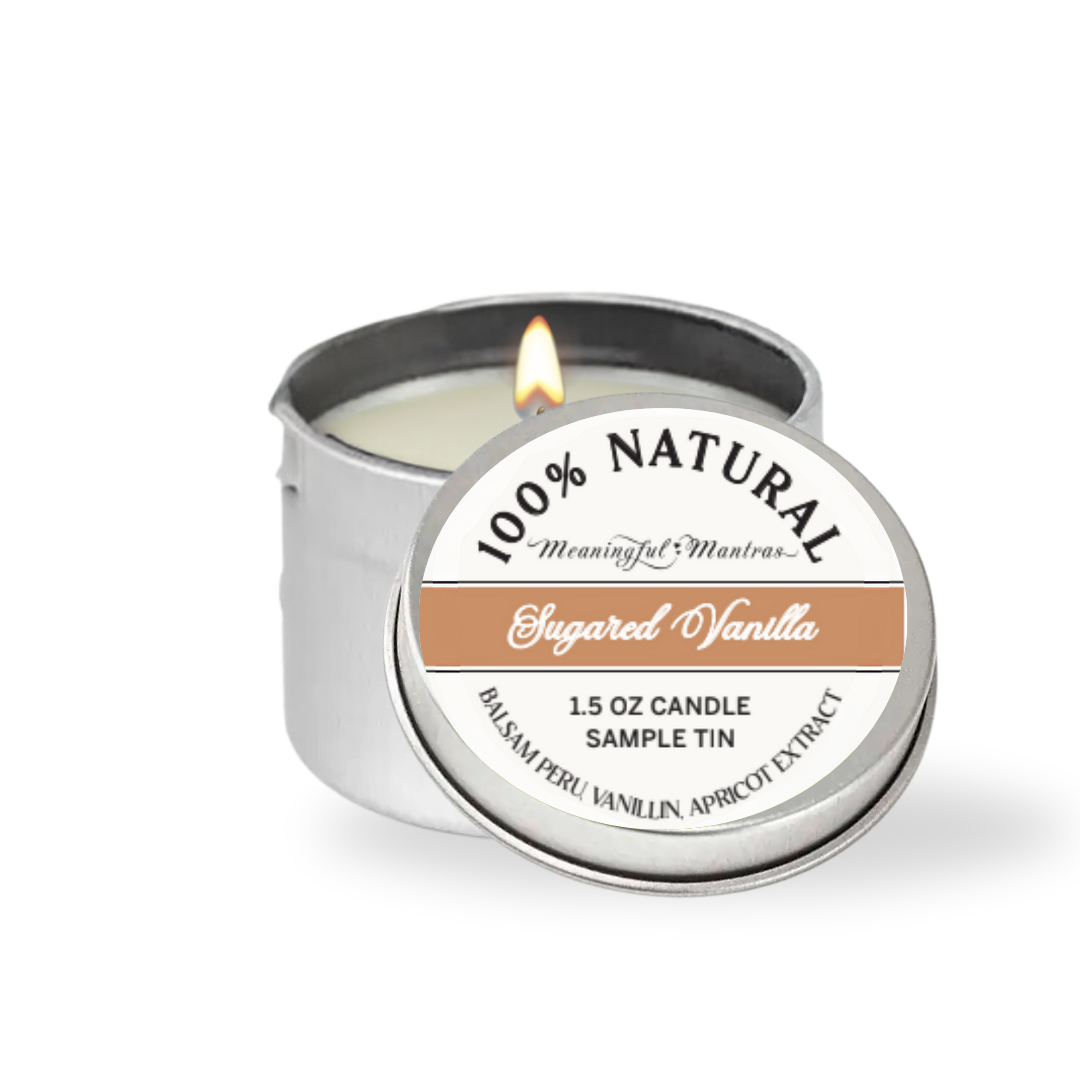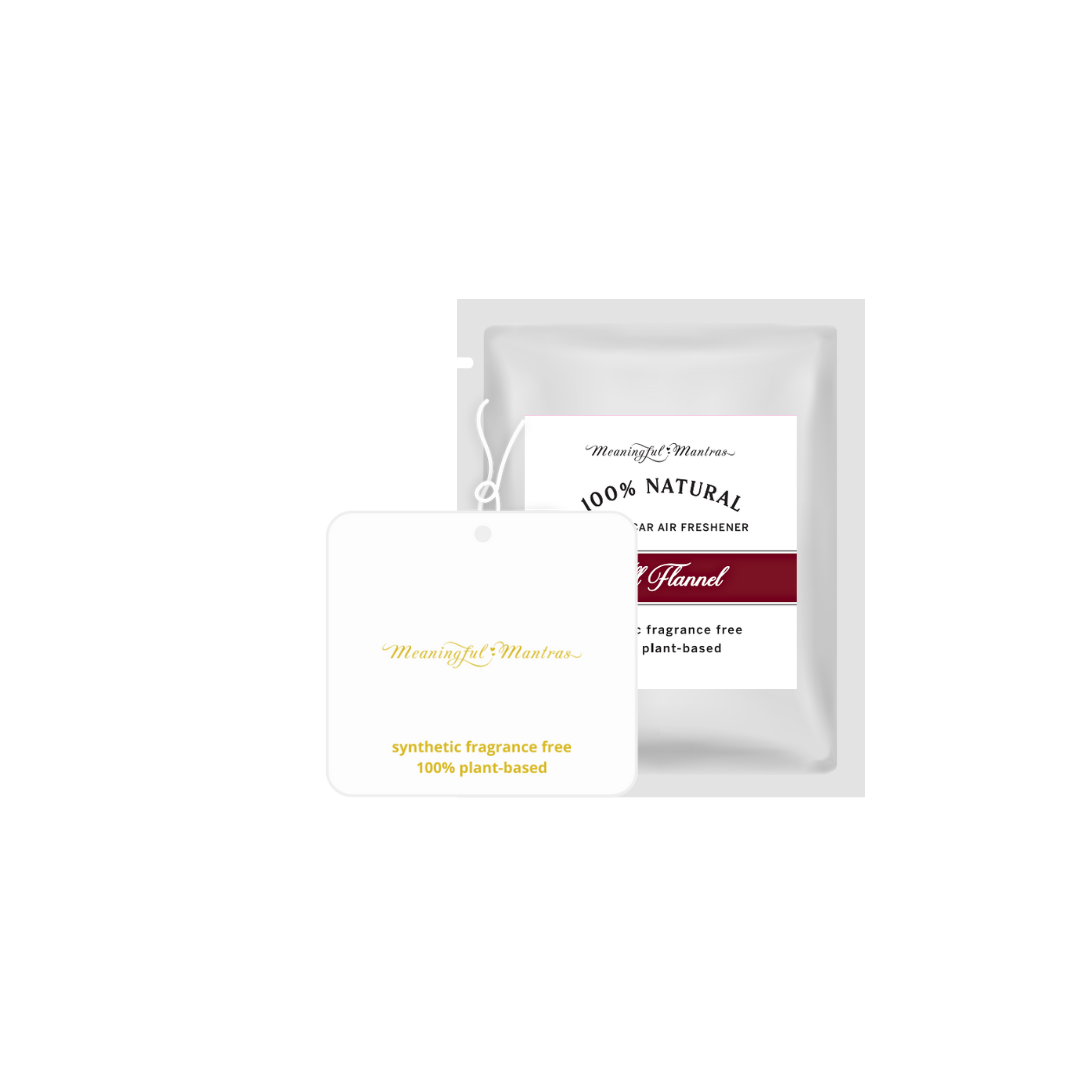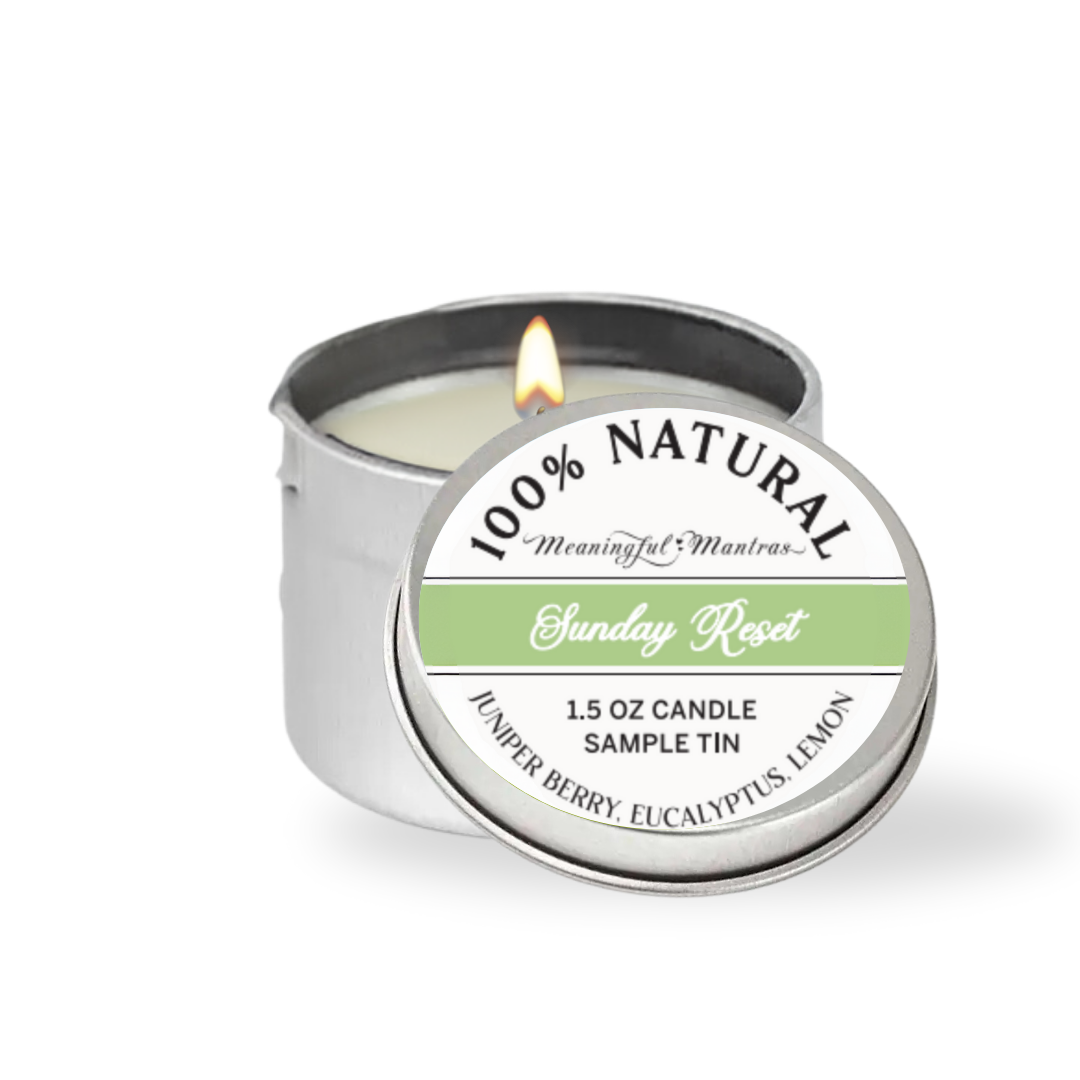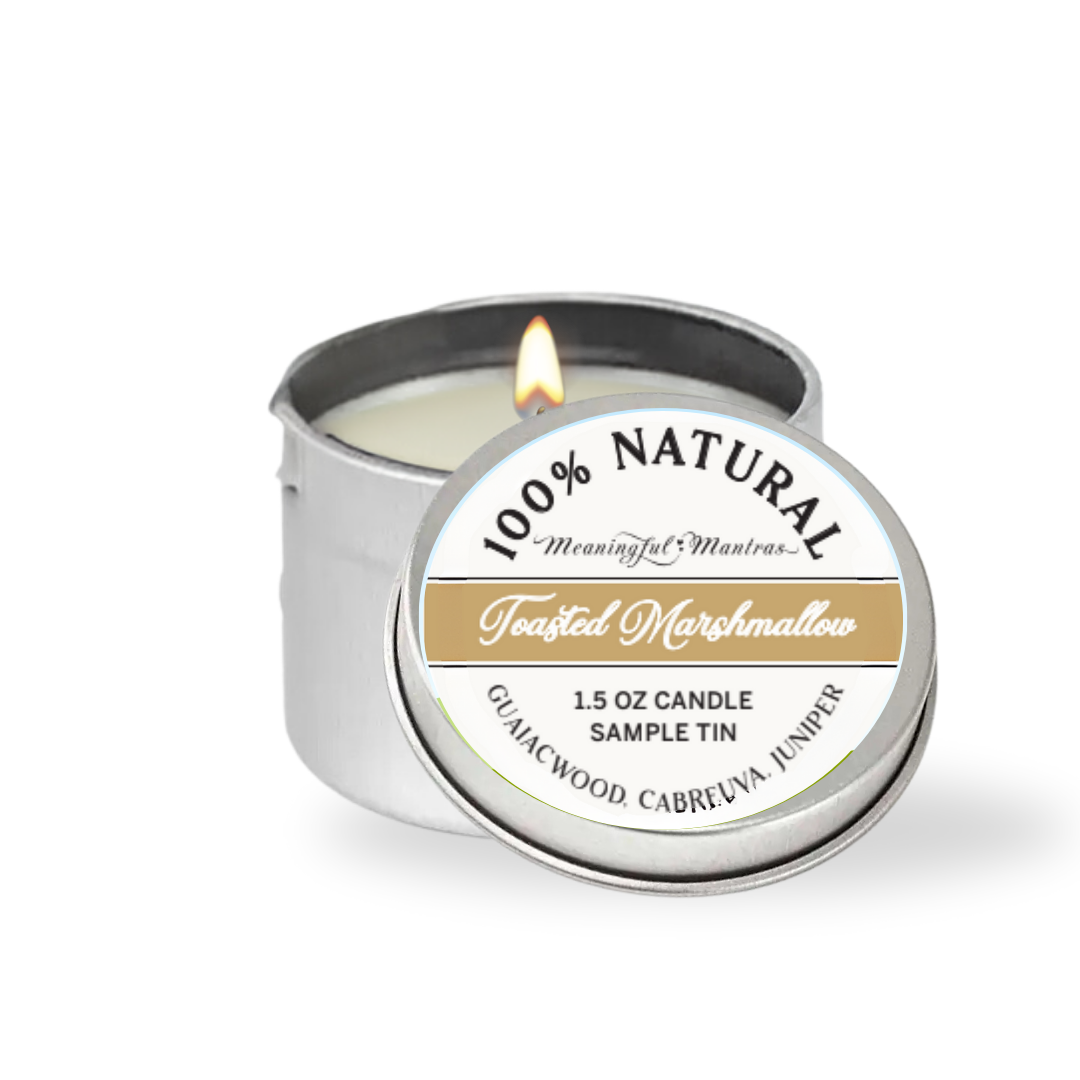Bergamot Essential Oil: Uplifting Aromatherapy and Skin Benefits
Harnessing the essence of the bergamot fruit, Bergamot Essential Oil stands out as a dual-purpose marvel celebrated for its refreshing fragrance and therapeutic effects on the skin. This oil, derived through the cold pressing of the bergamot fruit peel, encapsulates a synergy of components that not only soothe the senses but also offer potent skincare benefits. Its signature citrus aroma elevates mood, reduces stress, and promotes emotional well-being, making it a staple in aromatherapy practices. On the skincare front, bergamot oil's antiseptic and antibacterial properties make it an effective ally in combating skin infections, enhancing healing, and improving skin texture. As we here at Meaningful Mantras explore the multifaceted benefits of Bergamot Essential Oil, you'll discover how to leverage its uplifting aroma and skin-nourishing properties to enrich your daily wellness oils routine.
What is Bergamot Essential Oil?
Bergamot Essential Oil is a fragrant oil with a citrus scent extracted from the peel of the bergamot fruit. This fruit is a unique hybrid, combining the qualities of a lemon and a bitter orange. Celebrated in aromatherapy and skincare, bergamot oil is prized for its uplifting aroma and therapeutic benefits. Its composition is rich in linalyl acetate, limonene, and linalool, making it a powerful tool for soothing the mind, fighting microbes, and enhancing mood. The oil's versatility is evident in its ability to reduce stress, promote emotional well-being, treat skin infections, and improve skin texture, marking it as essential in wellness routines.
How is Bergamot Oil extracted?
The extraction of Bergamot Essential Oil is a delicate process that utilizes cold pressing. This method explicitly targets the bergamot fruit peel, where the essence of the oil is concentrated. The oil is released without applying heat by mechanically pressing the peel, ensuring its aromatic and therapeutic qualities are preserved. This technique is crucial for maintaining the oil's rich linalyl acetate, limonene, and linalool content. These components are the backbone of bergamot oil's soothing, antimicrobial, and mood-enhancing properties, making it a powerful asset in aromatherapy and skin care.
Cold pressing of the bergamot fruit peel
The cold pressing method is pivotal for extracting Bergamot Essential Oil directly from the fruit peel. This mechanical process applies pressure to the peel, effectively squeezing the oil and avoiding heat use. The absence of heat is crucial as it preserves the oil's rich therapeutic and aromatic compounds—linalyl acetate, limonene, and linalool—ensuring they remain unaltered. These compounds are the heart of bergamot oil's ability to soothe, disinfect, and uplift. Cold pressing is lauded for efficiently yielding a pure, potent oil, rendering it indispensable in aromatherapy and skincare realms.
The oil is derived from the bergamot fruit, primarily grown and harvested in the Calabria region of Italy. This area is renowned for its ideal climate and soil conditions, perfect for cultivating bergamot fruit. The unique geographical and environmental factors of Calabria contribute significantly to the distinctive fragrance and therapeutic properties of Bergamot Essential Oil. The majority of the world's supply of bergamot oil comes from this region, making it an essential part of the local economy and a cultural heritage.
Bergamot oranges are harvested from November to March, with the peak season in the winter months. Once harvested, the fruit undergoes the cold pressing process, where the peel is mechanically pressed to extract the essential oil. This method ensures that the delicate, volatile compounds responsible for the oil's aroma and therapeutic benefits are not damaged by heat, resulting in a high-quality, aromatic oil cherished worldwide.
The specificity of the bergamot fruit's origin and the traditional extraction method used contribute to the uniqueness and high value of Bergamot Essential Oil. Its extraction involves a careful process and carries the essence of a region known for its rich history and expertise in producing one of the most sought-after essential oils in aromatherapy and skincare. The bergamot orange is widely used in perfume.
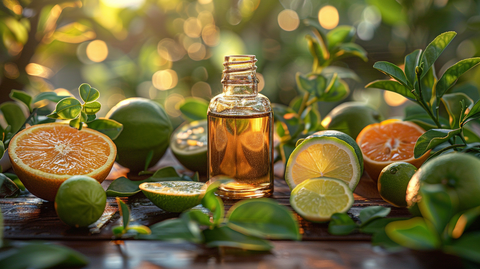
What are the main components of Bergamot Essential Oil?
At the core of Bergamot Essential Oil are three pivotal compounds that define its therapeutic and aromatic profile: linalyl acetate, limonene, and linalool. Linalyl acetate is celebrated for its inflammation-soothing and relaxation-promoting properties, which are crucial in the oil's calming effects. Limonene contributes to the oil's signature citrus scent, offering an uplifting aroma that can positively affect mood and emotional well-being. Linalool adds valuable antimicrobial properties, enhancing the oil's capability to combat bacteria and support skin health. These components synergize to form the multifaceted essence of Bergamot Essential Oil, rendering it an indispensable ally in bergamot aromatherapy oil and skincare.
Below is a detailed table of the main components found in Bergamot Essential Oil, including their functions and approximate concentrations, to provide a clearer understanding of its unique properties. Bergamot orange is commonly used in perfume, eau de cologne, Earl Grey tea, and cosmetics.
| Component | Function | Approximate Concentration |
|---|---|---|
| Linalyl acetate | Soothes inflammation, promotes relaxation | 30-60% |
| Limonene | Provides a citrus scent, uplifts mood | 8-15% |
| Linalool | Offers antimicrobial properties | 1-5% |
Linalyl acetate - soothes inflammation
Linalyl acetate stands out in Bergamot Essential Oil for its powerful anti-inflammatory effects. This compound is key to alleviating skin irritation, diminishing redness, and fostering a tranquil environment for the body and mind. Its soothing properties highlight the oil's dual functionality in mood enhancement and physical comfort.
Limonene - provides a citrus scent.
Limonene is the driving force behind the refreshing citrus scent of Bergamot Essential Oil. This aromatic compound elevates the oil to a mood-boosting marvel, uplifting spirits and enhancing emotional well-being. The fresh, zesty aroma of limonene plays a crucial role in revitalizing the senses and purifying the mind.
Linalool - offers antimicrobial properties.
Linalool enriches Bergamot Essential Oil with its antimicrobial prowess, fortifying the body's defense against microbial invaders. This component is essential for maintaining skin health, preventing bacterial infections, and facilitating healing. Linalool's inclusion not only broadens the oil's application in skincare but also cements its status as a staple in aromatherapeutic practices.
This detailed breakdown and comparison of the main components of Bergamot Essential Oil aim to provide a comprehensive understanding of its therapeutic and aromatic qualities.
What are the aroma benefits of Bergamot Essential Oil?
Bergamot Essential Oil shines with its captivating citrus scent, bringing many aroma benefits that transcend straightforward enjoyment. This fragrance is a powerhouse for uplifting spirits and calming odor, significantly enhancing mood and overall emotional well-being. Its prowess in reducing stress and anxiety and its potential to decrease cortisol levels and calm odor positions it as an invaluable asset in aromatherapy. Here, bergamot oil's soothing and rejuvenating properties are leveraged to foster a lifestyle marked by balance and tranquility.
Recent studies have provided evidence supporting the beneficial effects of Bergamot Essential Oil on mood, stress, anxiety, and cortisol levels. Below is a table summarizing key research findings:
| Study Reference | Year | Key Findings |
|---|---|---|
| Ni, C.H., et al. "The Anxiolytic Effect of Aromatherapy on Patients Awaiting Ambulatory Surgery: A Randomized Controlled Trial." | 2013 | Found that inhalation of bergamot essential oil significantly reduced pre-operative anxiety among patients. |
| Saiyudthong, S., & Marsden, C.A. "Acute effects of bergamot oil on anxiety-related behavior and corticosterone level in rats." | 2011 | Demonstrated that bergamot oil inhalation reduced anxiety-like behavior in rats and significantly lowered corticosterone response to stress. |
| Sanada, K., et al. "Effects of Aroma Hand Massage on Pain, State Anxiety and Depression in Hospice Patients with Terminal Cancer." | 2008 | Showed that a blend of bergamot, lavender, and frankincense oil used in hand massage significantly reduced pain and depression in hospice patients with terminal cancer. |
| Watanabe, E., et al. "Effects of Bergamot (Citrus bergamia) Essential Oil Aromatherapy on Mood States, Parasympathetic Nervous System Activity, and Salivary Cortisol Levels in 41 Healthy Females." | 2015 | It was found that bergamot essential oil aromatherapy improved positive feelings and increased parasympathetic nervous system activity, with a tendency to reduce salivary cortisol levels. |
Uplifting and calming effects
The uplifting and calming effects of Bergamot Essential Oil stand at the forefront of its aroma benefits. Its vibrant citrus scent elevates the spirit and calms the mind, striking a perfect balance between energizing and soothing. Due to the effects of bergamot extract, this dual action makes it an ideal choice for creating an atmosphere of tranquility and positivity.
Enhances mood and emotional well-being
Bergamot Essential Oil is potent in enhancing mood and bolstering emotional well-being. The oil's refreshing and invigorating aroma stimulates the senses, paving the way for a more joyful and content state of mind. It acts as a natural mood lifter, fostering an environment where well-being thrives.
Reduces stress and anxiety
The capability of Bergamot Essential Oil to effectively reduce stress and anxiety is one of its key attributes. Its aromatic essence works wonders on the nervous system, soothing anxiety and easing stress. This contributes to a more relaxed, peaceful state, allowing individuals to navigate their day with less tension and more clarity.
Lowers cortisol levels in the body
Bergamot Essential Oil plays a significant role in lowering cortisol, the body's stress hormone. Elevated cortisol levels can lead to numerous health issues, but these levels can be reduced through the calming influence of bergamot oil. This action helps alleviate stress-induced symptoms and enhances overall wellness, making bergamot oil a valuable ally in stress management.
This detailed inclusion of research findings aims to provide a comprehensive understanding of the aroma benefits of Bergamot Essential Oil, backed by scientific evidence.
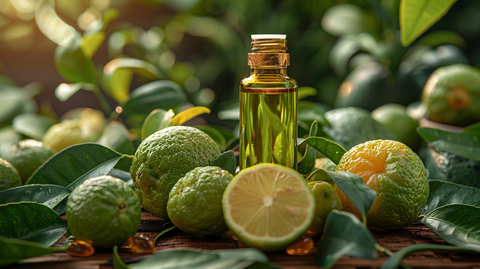
What are the skin benefits of Bergamot Essential Oil?
Bergamot Essential Oil is not just a feast for the senses with its citrus aroma; it's also a treasure trove of skin benefits. Antiseptic and antibacterial properties position it as a powerful tool in the fight against skin infections, safeguarding the skin's health. Its prowess in promoting skin healing is noteworthy, as it accelerates the recovery of wounds and diminishes the visibility of scars and marks. Moreover, bergamot oil is crucial in lightening the skin and enhancing its texture, leading to a more even-toned and glowing complexion. These attributes highlight the oil's multifaceted utility in skin care, making it a sought-after natural solution for achieving healthy and beautiful skin.
To provide a clearer understanding of how Bergamot Essential Oil benefits the skin, including its application in skin care products and treatments for specific conditions, the following table details its key properties, uses, and effectiveness:
| Skin Benefit | Description | Application | Effective For |
|---|---|---|---|
| Antiseptic and Antibacterial | Bergamot oil's antiseptic properties help to cleanse the skin, reducing the presence of harmful bacteria. | Applied topically in diluted form to affected areas or added to cleansers. | Acne, skin infections |
| Promotes Skin Healing | Encourages the natural healing process of the skin, aiding in the repair of cuts, scrapes, and other minor wounds. | Mixed with a carrier oil and applied to wounds or used in healing balms. | Cuts, scrapes, minor wounds |
| Reduces Scars and Marks | Helps in the reduction of the appearance of scars and marks by promoting cell regeneration. | Added to scar treatment creams or diluted with a carrier oil for direct application. | Acne scars, marks from skin injuries |
| Lightens and Improves Skin Texture | Aids in lightening the skin and improving its overall texture, contributing to a more even-toned and radiant complexion. | Incorporated into lotions, creams, or serums aimed at brightening and texturizing. | Uneven skin tone, dull complexion |
| Anti-inflammatory | Soothes inflammation and reduces redness, providing relief for irritated skin. | Applied in diluted form to inflamed areas or added to soothing skincare products. | Eczema, dermatitis, redness |
Antiseptic and antibacterial properties
Bergamot Essential Oil boasts potent antiseptic and antibacterial properties, making it an effective ally in safeguarding skin health. These properties are critical in warding off harmful microbes, ensuring the skin remains protected against infections, and promoting a healthy skin environment.
Prevents and treats skin infections
The oil's capacity to prevent and treat skin infections stands out among its numerous benefits. By creating a hostile environment for bacteria and other pathogens, Bergamot Essential Oil maintains clear, infection-free skin, underpinning overall skin wellness and durability.
Promotes skin healing
Bergamot Essential Oil is known for promoting skin healing and aiding the skin in recovering its barrier function. Its therapeutic qualities bolster the skin's natural healing mechanisms, facilitating swift and effective repair from damage or irritation.
Accelerates the healing process of wounds
Notably, the oil excels at accelerating wound healing. Its components synergize to boost the body's healing response, leading to quicker recovery times and reducing the likelihood of scarring or extended inflammation.
Helps in reducing scars and marks
Additionally, Bergamot Essential Oil significantly reduces the appearance of scars and marks. Its regenerative properties lessen the visibility of scars, promoting smoother and more uniform skin texture.
Lightens and improves skin texture
Finally, the oil is celebrated for its ability to lighten the skin and enhance its texture. By encouraging cell renewal and minimizing pigmentation, Bergamot Essential Oil helps achieve a brighter, more luminous complexion, highlighting the skin's inherent beauty.
This detailed breakdown aims to provide a comprehensive understanding of the skin benefits of Bergamot Essential Oil, including its application in treating specific skin conditions and enhancing overall skin health.
How to use Bergamot Oil for aroma benefits
To tap into the uplifting and calming aroma benefits of Bergamot Essential Oil, incorporating it into your daily life can be both simple and versatile. Diffusion and inhalation are favored approaches, each offering unique ways to enjoy the refreshing citrus scent of bergamot oil. These methods enable the essence of bergamot oil to effectively calm the mind, alleviate stress, and uplift emotional well-being, making it a valuable asset in any aromatherapy toolkit.
Below is a table providing specific recipes and ratios for using Bergamot Essential Oil for its aroma benefits:
| Method | Instructions | Purpose |
|---|---|---|
| Diffusion | Add 3-5 drops of Bergamot Essential Oil per 100ml of water in a diffuser. | To uplift and refresh the atmosphere in a room. |
| Inhalation | Add 2-3 drops of Bergamot Essential Oil to a bowl of steaming water. Cover your head with a towel and inhale deeply for 5-10 minutes. | For direct inhalation to relieve stress and anxiety. |
| Personal Inhaler | Add 15-20 drops of Bergamot Essential Oil to the cotton wick of a personal inhaler. Use as needed by inhaling deeply. | To carry the uplifting scent with you for on-the-go stress relief. |
| Aroma Spray | Mix 10 drops of Bergamot Essential Oil with 1 cup of water and a teaspoon of alcohol (as a preservative) in a spray bottle. Shake well before each use. | To create a refreshing and mood-enhancing room spray. |
Diffusion
Diffusion oil is an excellent way to spread the uplifting aroma of Bergamot Essential Oil throughout your environment. Employing an oil diffuser enables the fine mist of the oil to permeate the air, enveloping the room in its refreshing citrus fragrance. This purifies the space and establishes a revitalizing ambiance that can elevate mood and promote a sense of well-being.
Using an oil diffuser for room fragrance
Incorporating Bergamot Essential Oil into your space through an oil diffuser is a seamless method to enhance room fragrance naturally. Adding just a few drops to your diffuser can transform any room into a tranquil haven, releasing a natural, inviting aroma that awakens the senses and fosters relaxation.
Inhalation
Inhalation offers a direct route to absorbing the therapeutic benefits of Bergamot Essential Oil. This approach facilitates the immediate intake of the oil's properties through the respiratory system, efficiently alleviating stress and bolstering emotional equilibrium.
Direct inhalation or steam inhalation for immediate effect
Direct or steam inhalation is a potent option for those seeking an immediate effect. Direct inhalation involves profoundly breathing in the oil's aroma straight from the bottle, while steam inhalation requires adding a few drops to boiling water and inhaling the resulting steam. Both techniques deliver a rapid and powerful means to enjoy bergamot oil's calming and mood-enhancing benefits.
How to use Bergamot Essential Oil for skin benefits
Leveraging the skin benefits of Bergamot Essential Oil requires a mindful approach to its integration into your skincare routine. A prevalent method involves diluting the oil with a carrier oil, such as coconut or jojoba oil, making it safe for skin application. This blend can be applied to targeted areas or incorporated into daily skincare practices. Furthermore, adding a few drops of bergamot oil to your favorite skincare products, like lotions or creams, enhances them with its antiseptic and healing properties. Whether utilized alone or as an addition to skincare formulations, bergamot oil is a natural ally in promoting skin recovery, diminishing scars, and refining skin texture.
Below is a table providing specific dilution ratios and recipes for using Bergamot Essential Oil for its skin benefits:
| Application | Recipe | Instructions | Purpose |
|---|---|---|---|
| Spot Treatment for Acne | 2 drops of Bergamot Essential Oil with 10ml of jojoba oil | Mix well and apply directly to blemishes using a cotton swab. | To target acne and reduce inflammation. |
| Scar and Mark Reduction Blend | 3 drops of Bergamot Essential Oil with 20ml of rosehip carrier oil | Combine oils and apply to scars or marks twice daily. | To help diminish the appearance of scars and skin marks. |
| Skin Brightening Serum | 5 drops of Bergamot Essential Oil, 5 drops of Lemon Essential Oil, 30ml of argan oil | Mix oils thoroughly and apply to the face at night. Avoid sun exposure. | For a brighter, more even-toned complexion. |
| Soothing Skin Balm | 10 drops of Bergamot Essential Oil, 50g of shea butter, 30ml of coconut oil | Melt shea butter and coconut oil over low heat, remove from heat, add Bergamot Essential Oil, pour into a container, and let it solidify. | To soothe and moisturize dry or irritated skin. |
| Refreshing Body Spray | 15 drops of Bergamot Essential Oil, 100ml of distilled water, 1 teaspoon of witch hazel | Mix all ingredients in a spray bottle. Shake well before each use. | For a refreshing and antimicrobial body spray. |
Diluted in carrier oils
Bergamot Essential Oil must be diluted in carrier oils to ensure it's gentle on the skin. This step is crucial for safely harnessing the oil's benefits, allowing you to enjoy its therapeutic effects without the risk of skin irritation.
Mix with coconut or jojoba oil for application.
Mixing Bergamot Essential Oil with coconut or jojoba oil is highly recommended for optimal application. These carrier oils are celebrated for their moisturizing properties and serve as the perfect medium to dilute bergamot oil, enhancing its efficacy and ensuring a soothing application.
Added to skincare products
Adding Bergamot Essential Oil to skincare products is a straightforward way to infuse your routine with its antiseptic and healing benefits. A few drops of bergamot oil can elevate your skincare regimen, offering tailored solutions for your skin's unique needs, whether it's lotions, cleansers, or serums.
Incorporate into lotions or creams for daily use.
Incorporating Bergamot Essential Oil into lotions or creams for daily use allows for a sustained release of its skin-enhancing properties. This method ensures your skin consistently receives bergamot oil's nourishing and healing benefits, promoting a healthier, more vibrant complexion over time.
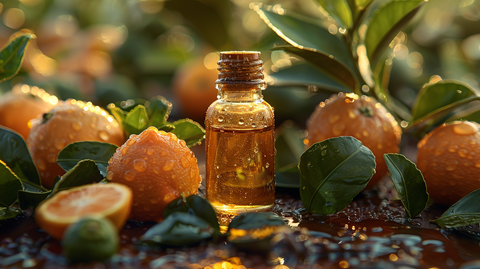
What are the precautions when using Bergamot Essential Oil
While the benefits of Bergamot Essential Oil are vast, it's crucial to heed certain precautions for safe use. A primary concern is phototoxicity; this oil can heighten the skin's vulnerability to sunlight, potentially leading to sunburn or irritation under UV exposure. Avoiding sun exposure or applying a high-SPF sunscreen after using the oil on the skin is recommended. Furthermore, the risk of allergies cannot be ignored. Performing a patch test before an extensive application is vital to detect any reactions to bergamot aromatherapy. By observing these safety measures, bergamot oil's aromatic and skin-enhancing rewards can be fully appreciated without compromising well-being.
Phototoxicity
Phototoxicity represents a notable concern with Bergamot Essential Oil, as it increases the skin's sensitivity to sunlight. This heightened sensitivity can lead to severe sunburn or irritation under UV exposure, emphasizing the need for caution.
Avoid sun exposure after application on the skin.
To safeguard against phototoxicity, it is essential to avoid sun exposure after applying Bergamot Essential Oil to the skin. If outdoor exposure is unavoidable, protective clothing or high SPF sunscreen can provide necessary protection.
Allergy risks
Allergy risks are another important consideration when using Bergamot Essential Oil. Since skin reactions can vary widely among individuals, identifying potential sensitivities is crucial for safe use.
Conduct a patch test before widespread use.
Conducting a patch test before widespread use is prudent to minimize the risk of allergic reactions to Bergamot Essential Oil. Applying a small amount of the diluted oil to a discreet skin area and observing for 24 hours can help ensure compatibility and prevent phototoxic reactions.




